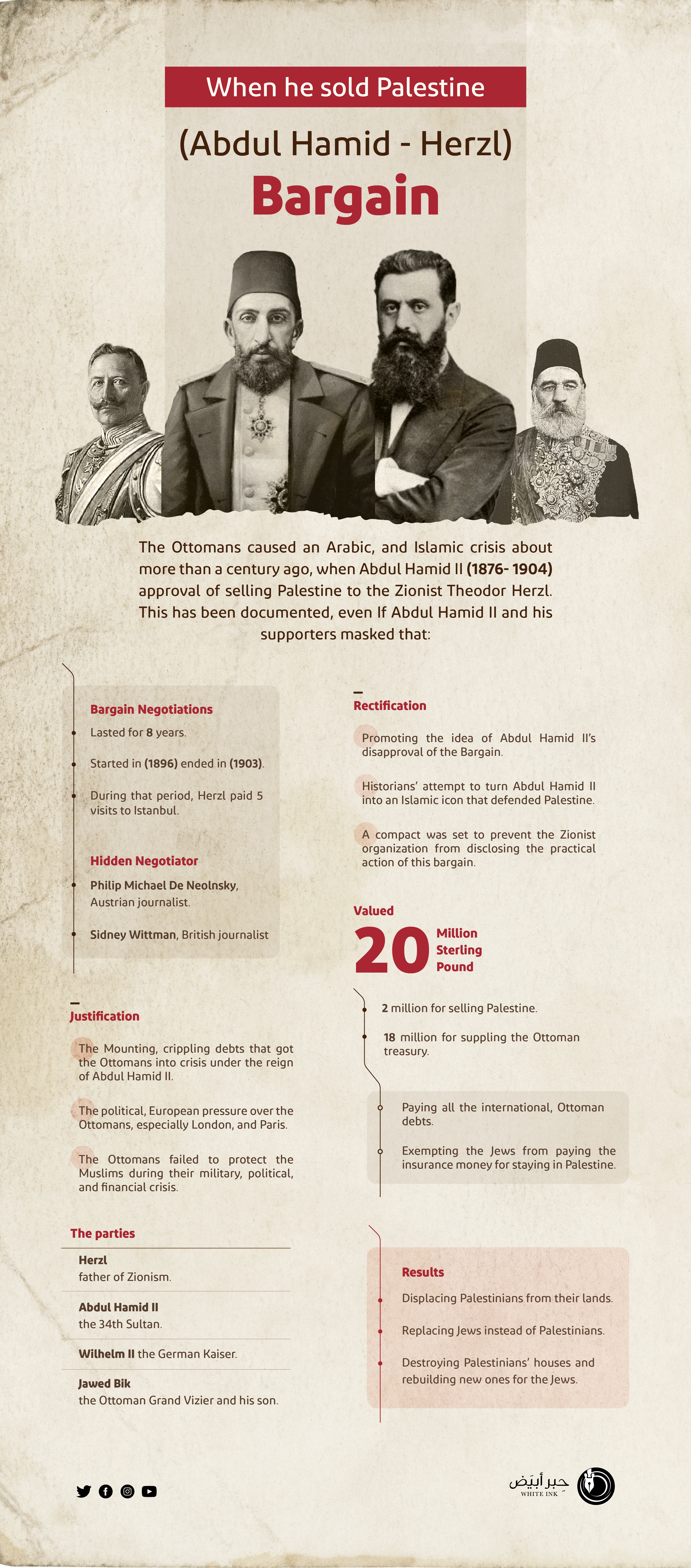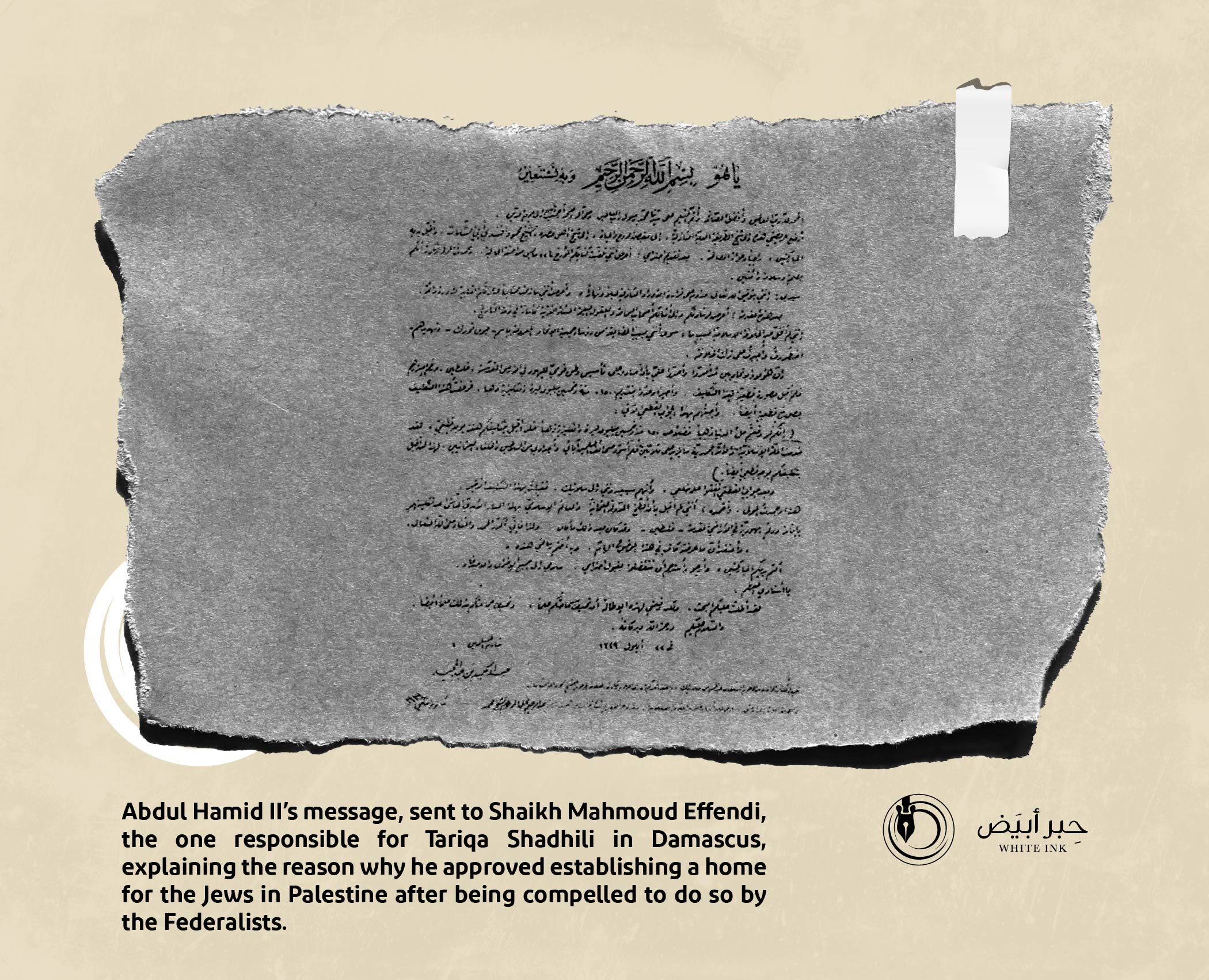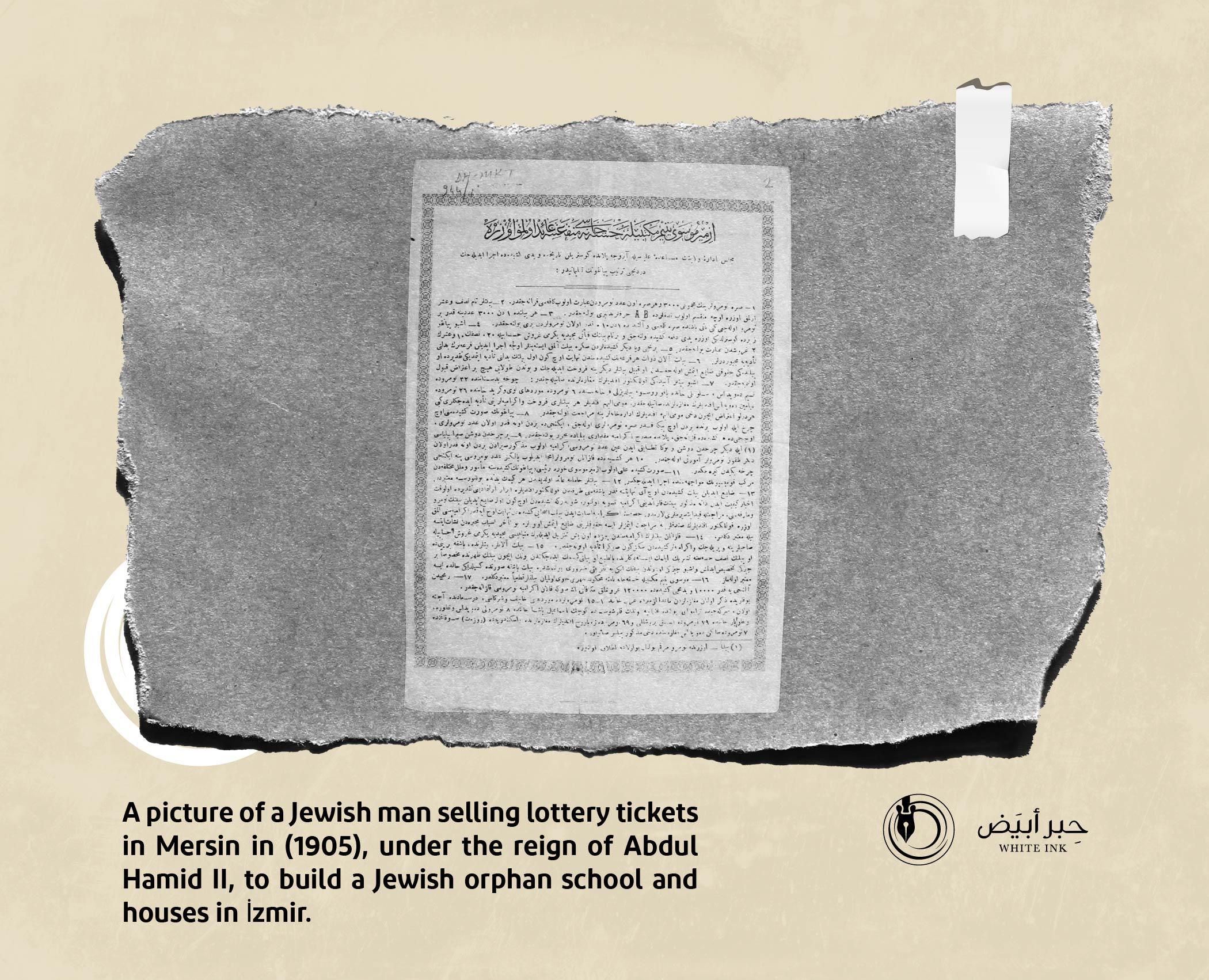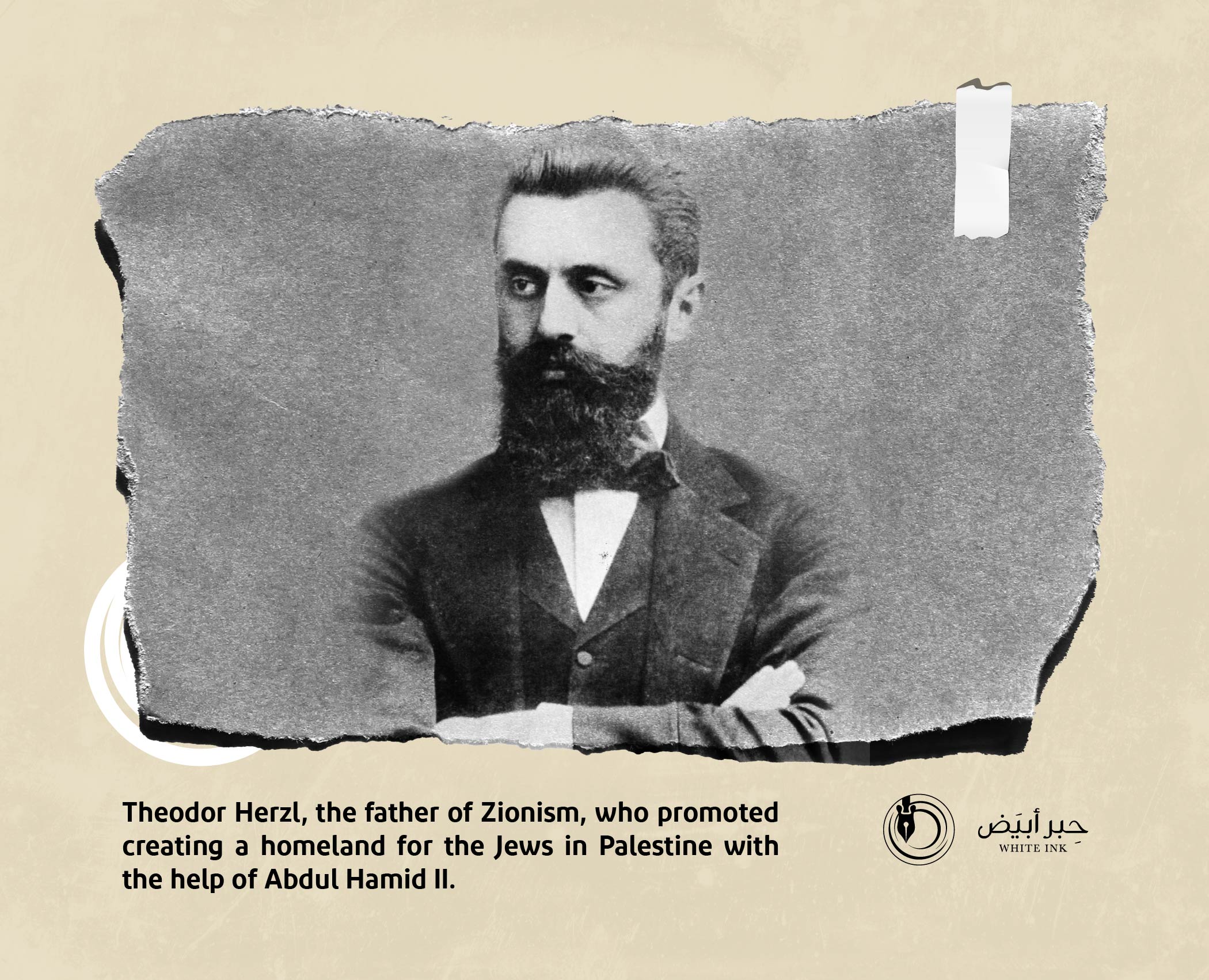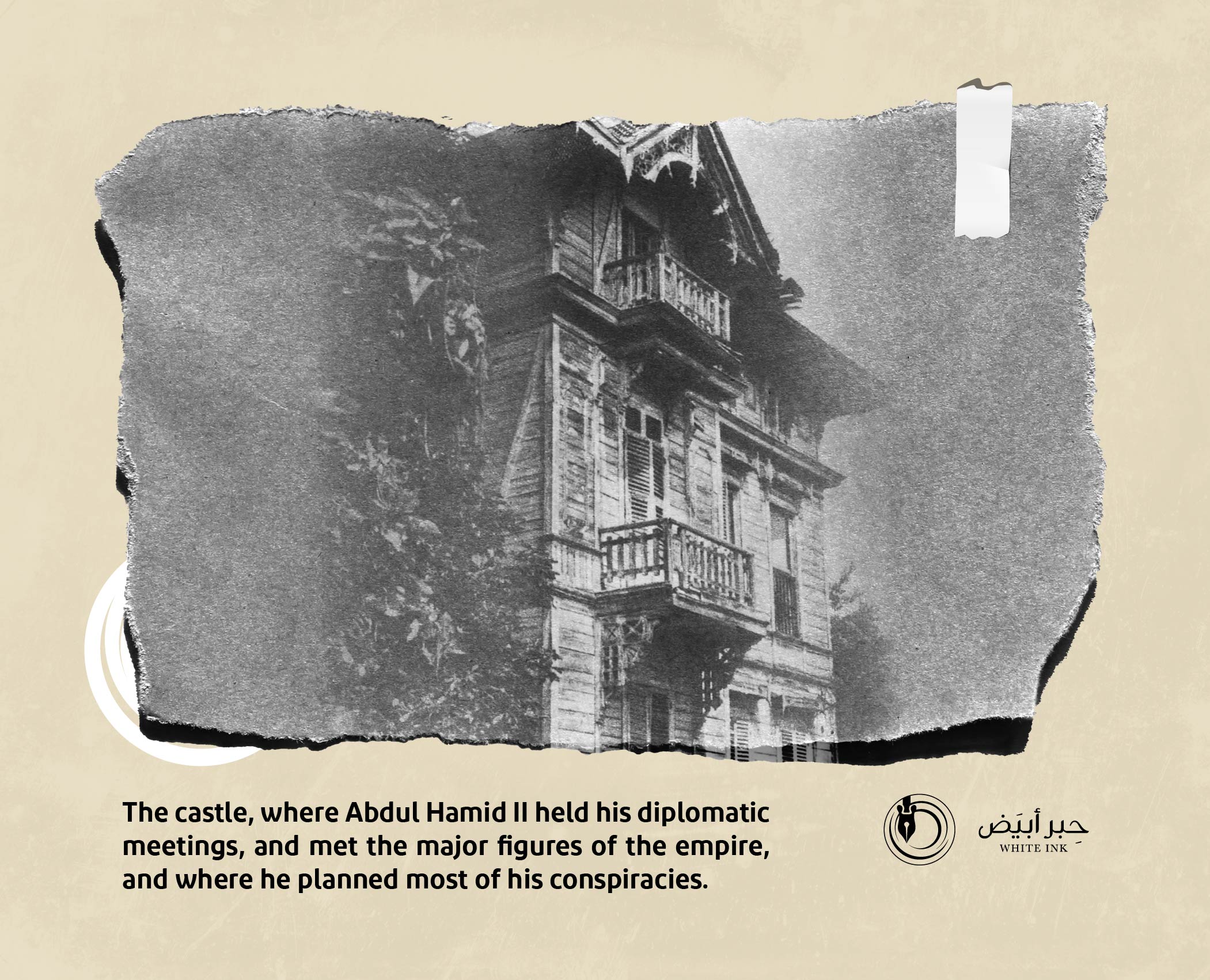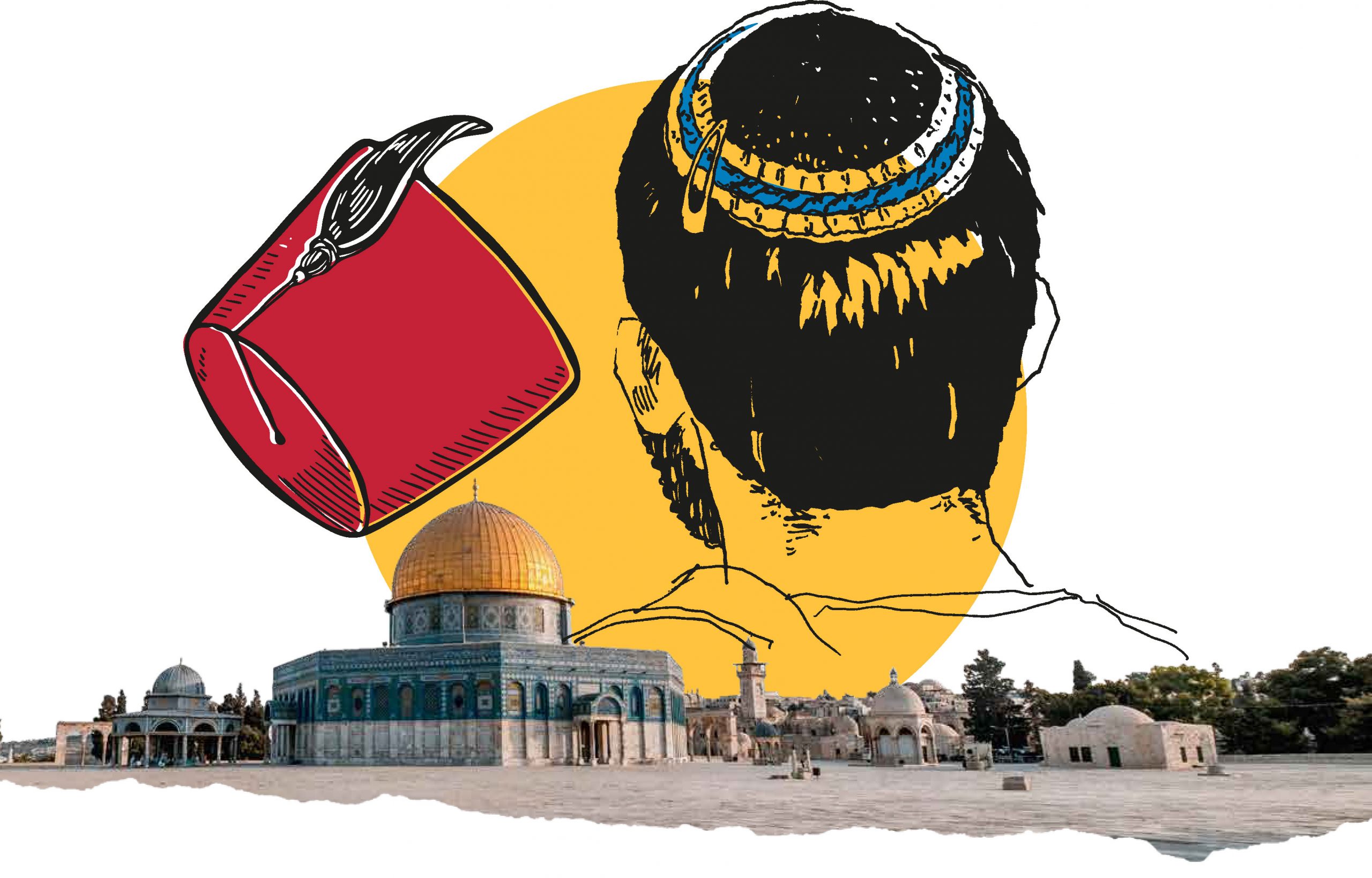
He replaced the "fez" with the Jewish hat
Abdul Hamid
sold Palestine and then cried over it
Who is Sultan Abdul Hamid?
His relationship with the Jews
In the diary of Theodor Herzl, the founder of the Zionist movement, he talks about his relationship, friendship, and gratitude to Abdul Hamid II, saying: “Abdul Hamid promised us with an independent Jewish state in exchange for paying his debts”. That relationship and partnership resulted in the establishment of the State of Israel at the expense of Palestine. The Ottoman Empire was at its worst and its treasury bankrupted. They used to describe it as a sick man. Abdul Hamid found only Herzl to be able to save his declining sultanate, starting secret negotiations and correspondence between them until they came up with a formula titled Money for Palestine. The negotiations over the sale of Palestine lasted for eight years, beginning (1896) and ending (1903 AD), with 5 visits by Herzl to Istanbul.
Abdul Hamid earned £ 20 million In exchange for the sale of Palestine.

in his book “The Ottoman State’s attitude towards the Zionist Movement”, Dr. Hassan Ali Hallaq mentioned that Abdul Hamid received Herzl with kindness, describing him as a sincere friend. He was asking him to save his country from bankruptcy. Herzl based his negotiations on the Ottomans’ urgent need for money, offering Abdul Hamid £ 20 million, divided as follows: Two million for the lands of Palestine and 18 million for the Ottoman Treasury, as a result of which the Jewish immigrants were granted exceptional privileges and facilities. Herzl returned to Europe and held the First Zionist Conference in Basel (1897 AD), announcing his Zionist goals to establish a homeland for the Jewish people under Ottoman auspices.
The mysterious Austrian who opened the door of friendship between Herzl and Abdul Hamid
That person is Philipp Michael de Newlinski (1841-1899), a journalist described as an Austrian politician. He worked as a responsible for political administration at the Austrian embassy in Istanbul, during which he was able to build a close friendship with Sultan Abdul Hamid. He left the diplomatic career in 1879 and resided in Paris as a journalist, then established a news agency in Vienna and published the daily “East Post” newsletter.
In the year (1896 AD), Theodor Herzl, the founder of the Zionist movement, contacted him and persuaded him to help the Zionist movement, asking him to arrange a meeting with a number of Ottoman leaders, headed by Sultan Abdul Hamid II. From that point on, the story began, which later resulted in the handover of Palestine to the Jews, in a grand bargain between Abd al-Hamid and Herzl.
Theodor Herzl mentions in his diaries that Newlinski told him that Sultan Abdul Hamid trusted him, and even commissioned him to mediate between the Sultanate and the Armenians who launched a war of independence in response to the Ottoman massacres against them. Indeed, Newlinski met them in Brussels, London and Paris to negotiate with them to submit to the Ottoman Empire in exchange for a number of reforms that they had demanded and were previously rejected by the Sultan. Newlinski said that the best way to influence the Sultan is to support him in the Armenian cause, which was confirmed by Herzl in his memoirs of contacts he had made with Armenian leaders in Europe in order to calm down and accept Sultan Abdul Hamid’s offer to repair the relationship with them.
The visit of Herzl to Istanbul
After the Austrian mediator Newlinski gained the confidence of Sultan Abdul Hamid, he began to convince him of the viability of the relationship with Herzl, a relationship that turned into a friendship between the Sultan and the founder of the Zionist movement. The Sultan agreed to visit Herzl and meet with the staff of his government, and this was the first visit, but one of five subsequent visits, which strengthened the relationship between the two parties.
Indeed, Newlinski arranged a visit for Herzl to Istanbul on June 18 (1896 AD), which was his first visit. The visit began with a meeting with the son of Prime Minister Javid Pasha, and the reason was to know Herzl’s intentions without counting an official meeting. The meeting revolved around three questions, the first about the fate of the holy sites – the Al-Aqsa Mosque – so he promised that they would be outside the borders of the Jewish state so that it would be for all religions and not for anyone alone, then he asked him about the relationship between the Jewish state and Turkey, then Herzl said: “Despite my desire for independence, it is possible to reach a virtual dependency in government, as is the case in Egypt and Bulgaria”. The third question was about the type of government in the Jewish state. Herzl’s answer was: “An Aristocratic Republic”. Javid advised him saying: Never mention the word republic before the Sultan because people in Turkey fear it like death.
On the second day, June 19 (1896 AD) the official meetings began, in order for Herzl to meet with the Grand Vizier Khalil Rifat Pasha, who listened quietly to him and then said: Palestine is great, in which part of it do you think? Herzl said: It depends on the benefits we will provide.
Herzl concluded his first trip to Istanbul by meeting with an official at the Foreign Ministry, Nuri Pasha. Herzl offered to free Turkey from the delegation of protecting the debts that burdened the Sultanate, which aimed to ensure that the Sultanate repaid its international debts, and that almost destroyed the Ottoman economy. Nuri Pasha was pleased with this, but he asked about Islamic places in Palestine, so Herzl reassured him and said: “Remember that we are the only buyers of something that has no value at all and is not expected to benefit others, and we are buyers of it at high prices”.
During Herzl’s first visit to Istanbul, he could not meet the Sultan, but he recounted in his diaries, quoting the Austrian mediator: “When Newlinski met the Sultan, Abdul Hamid asked him: Are the Jews determined to take Palestine at any cost? Can they not live in any other country, Newlinski replied: Palestine is their cradle and to it they want to return, so the Sultan said: But it is the cradle of other religions as well. So Newlinski said: If the Jews cannot take Palestine, they will go to Argentina”.
Herzl left Turkey on June 28 (1896 AD) without meeting the Sultan. But it was not the end, as Herzl explained it in a letter that he sent regarding his discussions with the Ottoman Sultan to Sadiq Khan, the chief rabbi of Paris and France, and the honorary head of the Lovers of Zion movement. He said: “The Sultan took note of my project (Palestine for the Jews). He treated me with distinction in several ways that made me understand that a deal could be concluded if we found the appropriate formula. It is a matter of preserving dignity, and I received the following offer from the Sultan’s entourage: The Sultan warmly calls on the Jews to return to their historical homeland and to settle there with self-rule, independent administration and subordinate to the Turkish Empire, and in return they pay him a tax”. Herzl also talks about his contacts with Jewish politicians and financiers in London and Paris with a view to getting them involved in the financial aid project.
Between Abdul Hamid and Newlinski
Certainly, the views on Palestine between the Austrian mediator who represented Herzl and Sultan Abdul Hamid were not about the principle of selling Palestine, but only about the administration of Jerusalem. A letter published by (Palestinian Studies Center) between Newlinski and Herzl states: “The Sultan said that he would never give up Jerusalem. The mosque of Omar must remain in the hands of the Muslims at all times. I told him: We will arrange this and we will make Jerusalem outside the borders of the state, thus not for anyone alone and for all at the same time, the sacred place is owned by all believers, the country of common culture and morals”.
In the context of the distinguished relationship between the Jews and the Ottoman Sultanate, which is confirmed by Herzl’s relationship with the Sultan, the Zionist Organization rushed to financially support the Ottoman Sultanate with huge sums. Here, the Palestinian Studies Center also publishes the following document: “Herzl suggested financial aid to the Ottoman Empire in exchange for Palestine. Things went according to the following text: Twenty million Turkish lira is spent to fix the financial situation in Turkey, we pay two million of these amounts instead of Palestine. This amount is based on the transfer of capital from the current government income, which is eight thousand Turkish lira per year. By using the eighteen million, Turkey was freed from the European delegation of protection. As for the shareholders of the first, second, third and fourth classes, we will make them satisfied with the removal of the delegation by granting them special privileges, higher benefits and an extension of the land ownership.
He tasked the new ruler with providing plots of land to the immigrants and exempting them from insurance.

Herzl's correspondence to his friend, the Sultan
“Our group wishes to offer a graded loan of £ 20 million based on the tax that Jews in Palestine pay to His Majesty. This tax, which is guaranteed by our community, amounts to £100,000 in the first year and increases to 1 million annually. This gradual growth in the tax relates to the gradual emigration of Jews to Palestine. The detailed workflow is set up in personal meetings to be placed in Istanbul”.
In return, His Majesty grants the following privileges: Jewish immigration to Palestine, which will not only be indefinite, but will be encouraged by the royal government in every possible way. Jewish immigrants are given the autonomy guaranteed in international law in the constitution, the government, and the administration of work in the land that is decided for them (Palestine as a semi-independent state). It must be decided in the Istanbul negotiations the detailed form in which the protection of the Sultan will be exercised in Jewish Palestine and how the Jews themselves will preserve order and law through their security forces.
The agreement may take the following form: His Majesty issues a gracious invitation to the Jews to return to the land of their fathers. This invitation will have the force of law and states will be informed of it in advance.
Abdul Hamid's role in selling Palestine to the Jews
He opened the gates of Palestine to the Jews and responded to their demands to remove the ruler of Jerusalem.

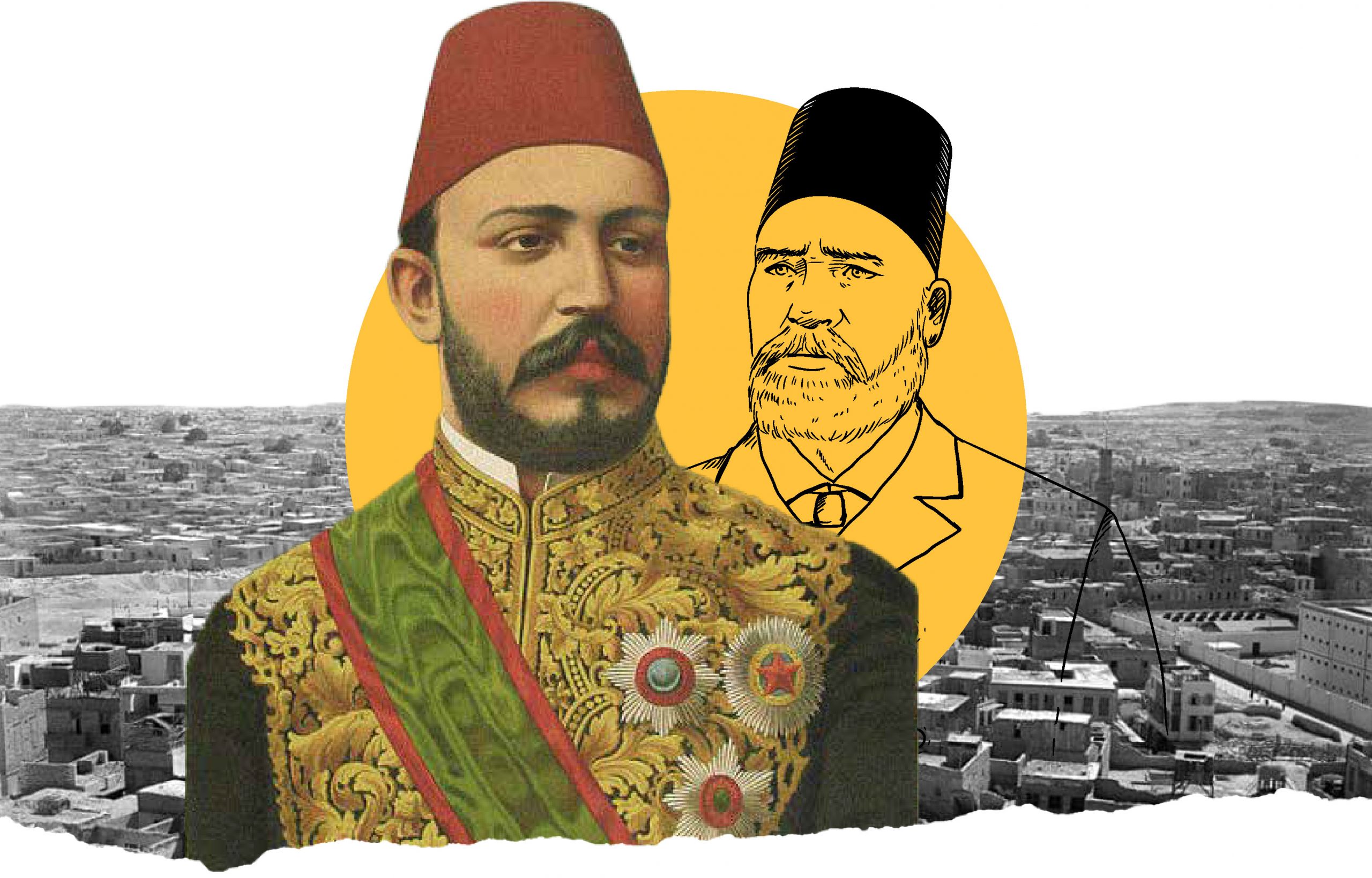
Because of Urabi’s revolution and because of the Sultan’s fear that he may come into clash with the British
Abdul Hamid the second helped the British to colonize Egypt
Urabi’s revolution is considered to be one of the most important, national, and Egyptian revolutions. It was carried out between (1881-1882). What makes this specific revolution important is not only related to its time, since, at that time, it was a rare thing to see such a revolution with that capacity and effect over the Middle East during 19th century and the beginning of 20th century, but also it is that it was the result of a public and cultural movement that started under the reign of Mohamed Ali, and the result of the changes that took place pertaining education and forming a national army based on recruiting the Egyptians.
Right here, we start to see the Egyptians being recruited for the first time ever since the time of the Pharos, or probably the age of the Ptolemies. Besides, no one can overlook the House of representatives, in Egypt, formed for the first time (in 1866) during Khedive Ismail’s reign. Later, that seemed encouraging to start demanding a constitution that organizes the country; and indeed, a constitution was drafted (in 1881). Some see that it was a well- drawn- up one according to the standards of that age.
Mohamed Ali refused his son’s, Ibrahim Pasha, desire to allow Egyptian soldiers reach higher ranks in the army claiming that if he allows that, they will turn against our family and the Ottoman Empire itself as Egypt was part of the empire at that time, and ruled by Mohamed Ali Dynasty.
Indeed, when Urabi and his friends became officers during Sa’id and Khedive Ismail’s reign, they turned against the Turkish and detested the fact only the Circassians reached the higher ranks in the Egyptian army. In effect, the Egyptian officers started demanding to given the chance to reach higher ranks.
The demands to Egyptianize the army grouped with the demands to Egyptianize the political state drove the Egyptian officers to ally with some Egyptian thinkers and politicians leading to the formation of the slogan, “Egypt for the Egyptians,” that became the symbol of Urabi’s revolution and the Egyptian national movement afterwards.
Some of the members of the house of representatives demanded ousting Khedive Tawfik because he was supporting foreigners. A national ministry had been formed with the poet Mahmoud Sami el-Baroudi as its president, and Ahmed Urabi as the minister of defense.
However, European countries, on top of all: Britain and France, expressed their concern over the foreign citizens as well as the European benefits from the Suez Canal in spite of Urabi’s confirmation that nothing will ever affect neither the foreign citizens nor their benefit from the Suez Canal.
Khedive Tawfik allied with the European countries, hence, Urabi decided to fight for the Egyptian people and defend their national demands. Seeing this, Britain compelled the Ottoman Sultan, Abdul Hamid II, to consider Urabi as a disobedient to the Sultan, and whoever fights for him will be disobeying the Ottoman Empire and the Islamic Empire. That was attempted to weaken Urabi and get the people to give up on him, so as not to be considered disobedient. That desire was truly fulfilled.
The British- oriented Sultan was merely a means to fulfil the British colonial agenda

However, even if that decision had little impact on the Egyptians, still, it de-legitimized Urabi and he was deemed disobedient of the Ottoman Empire which, at that time, was considered, based on the international law, the sovereign over Egypt. Besides, it gave the English military intervention in Egypt a legitimized cover. Indeed, they colonized Egypt in (1882) and crushed Urabi’s revolution. Urabi and his friends were arrested and banished to the Island of Ceylon. As a result, the British Colonization over Egypt continued till the year (1954), when the Anglo-Egyptian treaty terminated the British military presence in Egypt.
It is certain that the Ottoman Empire’s reaction towards Urabi’s revolt is detested by the Egyptian nationalists. So, in an attempt to justify the Sultan’s reaction towards Urabi’s revolution, Suleiman Gokah, a Turkish Historian, has written in his book” Sultan Abdul Hamid II: his character and politics,” that Britain was interested in colonizing Egypt so as to control Suez Canal, since it was its way to reach India, and that at the same time the Sultan detested what Urabi was doing. He believed that the revolution would give Britain the chance to conquer Egypt; “He saw that Urabi was nothing but a step in the process of colonization.” Besides, Gokah claims that the Sultan sent some of his representatives to dissuade Urabi, yet he refused. However, Urabi appealed to the Sultan to provide him with Ottoman military forces to fight the British, but the Sultan refused for fear that he would come into clash with the British if did so.
Abdul Hamid’s renunciation of the Arab started with Egypt

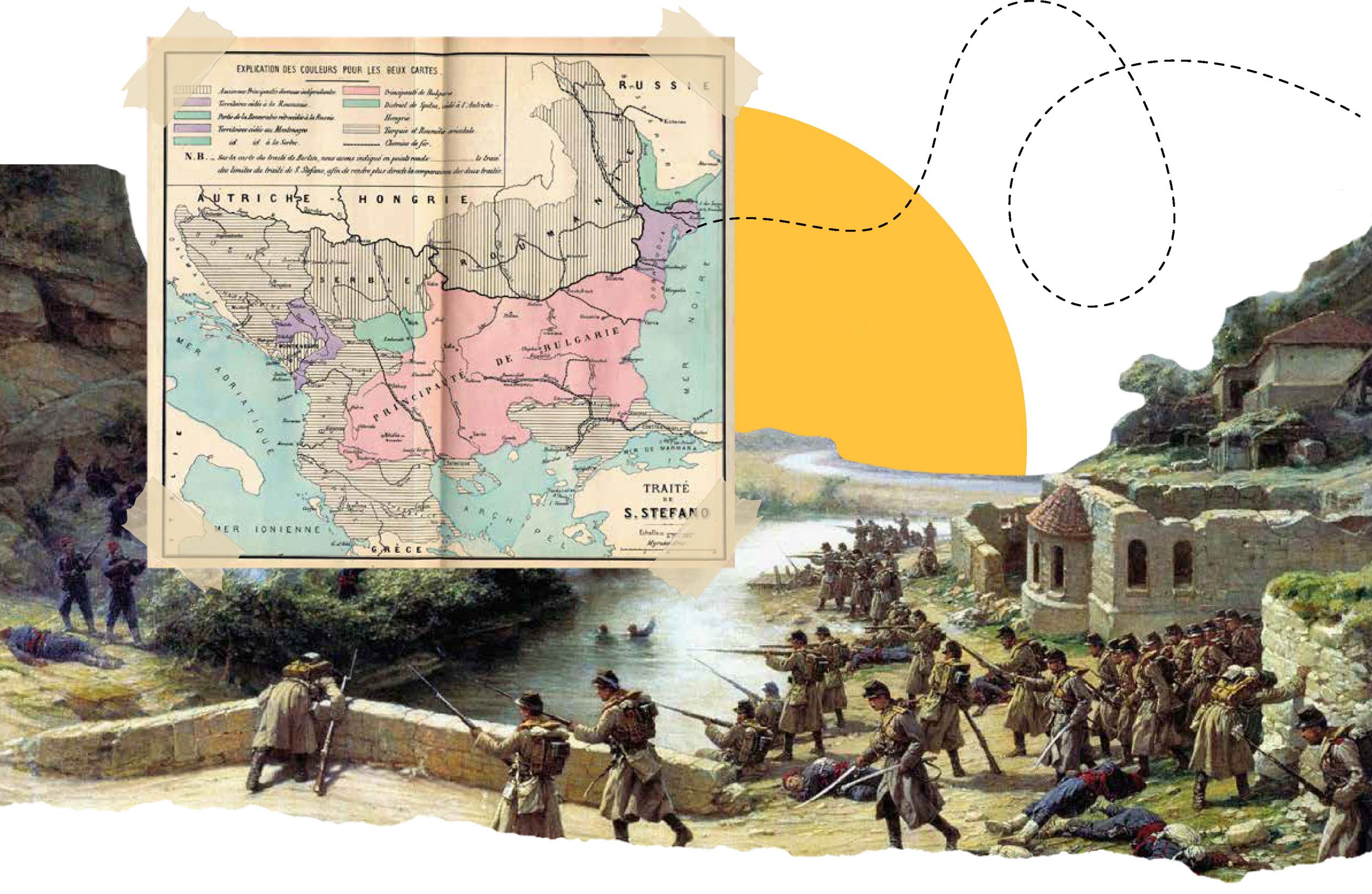
The Russian Calamity in Servicing the Dictatorship of the Ottoman Sultan
Jouka: Abdul Hamid was
“like a scared kid that his back scourged with a thick truncheon”
Russian-Ottoman relations were marked by an intense rivalry between the two empires; which sometimes were taking a religious dimension and, at other times, colonial and economic dimensions. When the religious conflict centered mainly on the privilege that was associated with the monopoly of religious reference in the region. Especially after the fall of Constantinople by the Ottomans, that was a historic opportunity for Tsarist Russia, which considered itself as the rightful heir to the Byzantine Empire.
Strategically, Russia was unable to access the warm waters of the Mediterranean, which led it to try to coerce the Ottomans to allow it to use the waterways for commercial purposes and other war purposes. That was a scramble, which took severe forms, particularly in the 19th century, when the Crimean Wars broke out (1853-1856 AD). That war ended with the Paris Conference, which grants great privileges to the Ottomans before the outbreak of the Balkan War (1877-1878 AD). The later war ended in a humiliating defeat for the Ottomans. When they were forced to sign the Treaty of San Stefano. Then some countries intervened to save the face of the Sultanate and called for Berlin Conference that could be considered the practical beginning for the fall of the Ottoman State, and opening the file of the so-called Eastern question.
The term “Eastern Question” is used to refer to all problems that were associated with the internal collapse of the Ottoman State and the revolutions of the peoples that were ruled by it. Finally, the term refers to the interwoven and conflicting interests of the European states in the Ottoman Empire as well as their intervention in the process of the Ottoman collapse.
The purpose of studying the relationship of Sultan Abdul Hamid II with Russia is not related to re-ruminate the historical facts that are filling books and literature, which monitored the relationship between the Ottoman State and the Tsarist Russia. But rather, it is by attempting to answer the methodological problematic that is deemed the center of gravity for the scientific article. This problematic, we believe, remains related to the answer to the following question: How did the military defeat before Russia contributed to strengthening the political influence of Sultan Abdul Hamid II? And how did the latter take advantage of post-war circumstances to successfully transform the government system of Sultanate from a parliamentary system to a dictatorial one that led some to describe the Sultan as a “tyrant”?
In this context, the internal political situation that followed the assumption of Abdel Hamid II for the mandate of the throne was quite critical. As the form of eliminating and killing or suicide of the Sultan Abdul Aziz remained and never left his imagination. Especially that some, of those whose hands were bloodied, were still holding important positions as well as moving entirely free in the political center. That made him suspect this junta, as he kept saying that rebels and revolutionaries will continue to be spoilers in every time and place. Abdul Hamid was waiting for the right opportunity to eliminate those who were stalking the seat of Sultanate.
On the other hand, the Russians considered that Constantinople as a religious symbol and a strategic importance for its control of the waterways of Bosphorus and Dardanelles that leading to the waters of the Mediterranean Sea. Thus, the control of these waterways means ensuring the freedom of transit for merchant vessels and warships. Particularly, since the economic weight shifted to the Russian seaport of Odessa that was bordering the Black Sea.
The Russians practiced their tutelage of Istanbul, as they considered that as a religious symbol for them during the era of Abdul Hamid II.

The Balkan Question
The defeat of the Ottoman State against Russia and the Balkan countries formed a historic opportunity for these countries to demand their complete independence from the Ottoman rule. Where a set of subjective and objective requirements were available to realize the dream of their independence. However, the religious element was presenting in the calls for independence, most writings confirm that the religious motivation was a peripheral compare to the widening gap of social inequalities due to the negative social policies of the Ottoman State. In addition to the rise of national trends without eclipsing the intervention of some of European powers that felt themselves directly or indirectly concerned with the Eastern question.
It can be argued that the Ottoman policy in the Balkans region, unlike that some people are promoting, affected not only Christians but also Muslims there. It was even argued that Muslims were more affected by the Ottoman policies and reforms that were limited to Christians but did not include the Muslims, such as the elimination of certain taxes and exemptions from military service, among others. In addition to the preferential intervention of foreign consuls for the benefit of Christians. Despite this discrimination, Balkan society suffered from a serious class policy. As the Social inequalities were not between Muslims and Dhimmis, yet they were between a ruling class and a governed one. In each class, one could find people of both categories.
The class conflict that contributed to the process of mobilization and crowding against the Ottoman State would be exploited by Russia, where Marxist ideas that crystallized thereafter and began to be active at that time to declare that the class conflict is one of the “most important tools of the revolution” in the words of Leon Trotsky.
In this respect, Tsarist Russia took advantage of the policy of arbitrariness, authoritarianism, and the taxation and collection system, which was imposed by the Ottomans on the inhabitants of the region – to strengthen the national feeling of the peoples of the Balkans. Further, it prompted them to revolt against the Ottoman rule. Where they took advantage of the internal situation of the Sultanate, which was living in the impact of an internal political crisis that was threatening its continued existence and leading to the demise of the Ottoman Family Sultan.
Abdul Hamid II was avoiding any direct confrontation with Russia
Abdul Hamid II tried to avoid upsetting Russia and attempted to befriend it in a manner that is inappropriate to the history and weight of the Ottoman State. As Suleiman Jouka Bash describes the behavior of Abdul Hamid II as: “a scared kid that his back scourged with a thick truncheon”. This feeling was recounted by the princess Aisha Osman Oglu, the daughter of the Sultan, in her diary, as she said: “He has not missed any opportunity to strengthen the ties of cordiality and friendship with the Russian Tsar in order to protect the Ottoman State from the threatening dangers that could cause by Russia. Additionally, that our geographical conditions impose this on us and make it as an inescapable and imperative duty”.
Abdul Hamid II demonstrated a great flexibility in his dealing with the Russian Tsar. Further, he showed a readiness to cede some of the territories that were under the Ottoman Sultanate. Nevertheless, he was manipulating to continue controlling the waterways that were as the most paramount political target to Russia for accessing the warm waters of the Mediterranean. In this regard, the Ottoman Sultan stated that: “For Turkey, the Straits are a matter of life. So we must conserve and protect them at all costs”.
He avoided disturbing Moscow, even in humility.

Abdul Hamid II and the confrontation with Russia:
The Russian-Ottoman War, or what is historically known as the Balkan War, although it led to the defeat of the soldiers of Sultanate and to the collapse of the Ottoman Empire delusion. However, there are evidences which indicate that the most beneficiary of this defeat was the Sultan Abdul Hamid himself. When he exploited the “calamity” to concentrate all powers in his hand. Moreover, he dissolved the Ottoman parliament and disrupted the democratic mechanism of governance. As he issued a decree, which was read by the Prime Minister Ahmed Rafiq Pasha, to suspend the parliament. It was recounted that the Sultan said after the decision of suspension: “It turned out to me that I was wrong, when I attempted to serve my nation through following the course of my Father, Sultan Abdul Majid, and establishing democratic institutions. Now; however, I would follow the course of my grandfather, Sultan Mahmoud, because, at this moment, I have come to believe that the course of power is the only way through which I could serve the nation that Allah has entrusted me to lead and preserve it “.
Similarly, it can be said that Sultan Abdul Hamid II, in common with the new Ottomans, took advantage of the relapse in front of Russia to transform the system of government from parliamentary to totalitarian, as well as to concentrate all powers in his hand. As he attempted to rule the areas under the Ottoman Sultanate with a strong hand, which is the dictatorial policy of which the Arabs would suffer the lion’s share.


